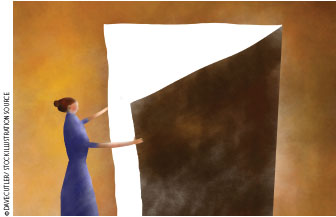THE CHALLENGE
Early in my nursing career, I worked with a nurse who had years of experience. She was the kind of nurse who passed all of her meds on time, who knew what to do in a crisis. In many ways, she was the go-to-nurse for the rest of us. If I had a question about what to do, I knew she would have a solution. But the flip side to her years of experience meant that she thought she knew exactly what was going on with each patient. And she had no problem telling me. On one shift, I had just returned from lunch when she said, “Mr. Anderson is asking for more blankets. And he says he needs to talk to you as soon as you get back.” She rolled her eyes, clearly dismissive.
“Yeah, he’s always asking questions.” My response was half excuse, half defense. I’d cared for Mr. Anderson for 3 days and she’d covered for me for 30 minutes, but that was enough for her to have formed an opinion. Her eye roll told me she thought that he was a whiner and was taking advantage of me. She sat at the nurse’s station, staring at me. She held her pen between two fingers and tapped it against the desk, waiting for me to ask for her advice.
“Thanks for your help,” I said and turned to go to the supply room.
“He’s got you wrapped around his finger.” She liked to get the last word in.
I was angry when I went for the blanket. Angry that I’d nearly let her response influence my care. Angry that she’d made me question my assessment of the patient. I respected her enough to think she might know something about my patient I didn’t know. That in 30 minutes, she’d figured him out. Certainly it was clear that she believed I was missing something. Did he have me wrapped around his finger? I didn’t think so. I thought we had made a good connection.
 I’d done it before myself. I had made assumptions about patients and their families after just a few minutes and from then on molded every interaction to fit that assumption. Someone was a “good” patient; another one was “difficult.” I’d read the chart for the history and physical, read about their previous medical history, the medications they took and the surgeries they’d had. I’d know about their other medical conditions, their work and family history. All of the essentials. In addition there is an intimacy to caring for a hospitalized patient that lulled me into thinking I knew more about them than I truly did. It was easy to think I knew all about Mr. Anderson.
I’d done it before myself. I had made assumptions about patients and their families after just a few minutes and from then on molded every interaction to fit that assumption. Someone was a “good” patient; another one was “difficult.” I’d read the chart for the history and physical, read about their previous medical history, the medications they took and the surgeries they’d had. I’d know about their other medical conditions, their work and family history. All of the essentials. In addition there is an intimacy to caring for a hospitalized patient that lulled me into thinking I knew more about them than I truly did. It was easy to think I knew all about Mr. Anderson.
I took the extra blankets in to him. And I answered his questions, the same ones, over and over. I didn’t know why he had so many questions, just that he did.
A few years ago, I took care of an elderly woman who was dying from metastatic breast cancer. I was impressed by how dedicated her daughter was. When the patient first introduced me to her daughter, I said, “I certainly see the resemblance between the two of you.” They both laughed. But it was kind of a nervous laugh, and it left me feeling that I had missed something. The daughter just said, “People tell us that all the time.”
As the patient continued to decline, she became confused—that ugly confusion we sometimes see. She was angry and cruel, yelling and sometimes throwing things. Yet the daughter stayed. Each day as I took report, I’d ask if the daughter had gone home; and each day, the report was the same: no, the daughter was still here. I felt terrible for her.
One day, the mother was having a particularly difficult time. I saw how troubling it was to her daughter, so I took her aside and suggested she take a break. “It’s hard when this happens,” I said. “It would be okay to take a little time off.”
We stood outside the room. The unit had a long, stark hallway. The usual daytime bustle was slowed. The lights were dimmed because visiting hours were over, and the place felt eerie. Down the hall, an IV pump was beeping, reminding me of the other tasks I had to complete. I placed my hand over the daughter’s. She leaned close and in a low voice, she said, “The thing is, I only met my mother a year ago. She gave me up for adoption. I don’t want to take a break and miss any more than I already have.”
I thought I knew their story: the one about the dying mother and the dedicated daughter who kept a bedside vigil. I thought I’d seen it before. But there was more to their story than I thought there was. The patient was more than a confused and angry dying woman. The daughter was more than a grieving relative. Both had a history, a story beyond the hospital. A story I knew only part of.
THE SOLUTION
In literature, the backstory is the information the writer draws on to form characters. It is the action that happens before the story begins. The writer must know her characters’ backstory to make them real, but not all of the backstory makes it on to the page. If it did, novels would be more like long diaries than novels.
The backstory for this mother and daughter was not one I expected. There were parts of it I hadn’t considered. Yet knowing about their past relationship helped me understand the dynamic between them. That experience reminded me to be open to other realities, to watch the assumptions I make about my patients.
The life stories of patients are more like mysteries than anything. There are unexpected revelations, characters whose roles change in unexpected ways. A red herring is thrown in every once in awhile just to keep me off balance. Or sometimes the story I think I know turns out to be wrong. Another one takes its place, a more interesting one. Just as when reading a book, I have to keep reading to discover what happens next. To let the mystery unfold. Sometimes, I might need to read between the lines, to keep turning the pages. Or sometimes I need to ask what happened in an earlier chapter. Working in oncology, I find it easy to think that because I know the end of the story, I also know what will happen before the end. But there are always surprises in store. ONA
Ann Brady is the symptom management care coordinator at the Cancer Center, Huntington Hospital, Pasadena, California.
Discussion questions
Have you worked with an experienced nurse who “knew” more about your patient and told you so? How did you handle what this nurse said?
What patient backstory has surprised you the most?
